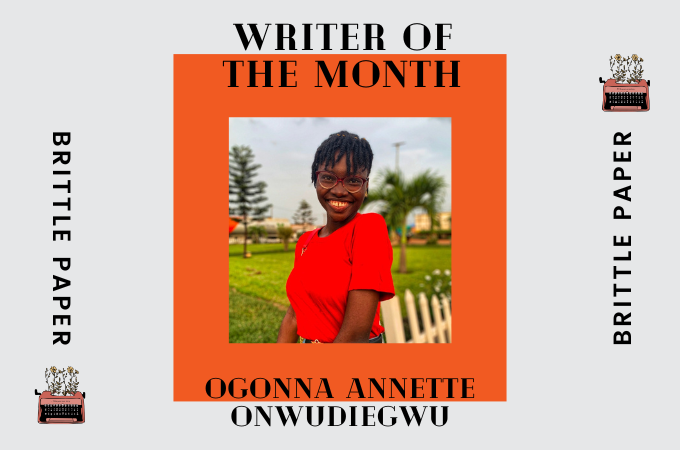
Brittle Paper’s Writer of the Month for June is Ogonna Annette Onwudiegwu!
Ogonna Annette Onwudiegwu is a final year law student, story curator and blogger who believes that everyone deserves a chance at love. She loves to tell untold stories, particularly those with women as its centrepiece. Her writings explore societal living, dissect traditional norms and question social phenomena.
Ogonna imagines herself to be an observer viewing life from a pair of detached lenses. She finds time so fleeting that she tries to immortalize it by writing about different experiences. She hopes that through it, people will find the courage to deviate from oppressive norms and draw the inspiration to make better decisions. When she is not thinking of her messianic mission of saving the world, you will find her blogging or searching refrigerators for cakes.
So, let’s see what else our wonderful Writer of the Month has to say!
***
Brittle Paper
Ogonna, congratulations on being our June Writer of the Month! Your story, “Breaking of Dams,” was my May highlight (which feels a little wrong to say given the theme). As our Writer of the Month, tell us about how Ogonna Annette Onwudiegwu became a writer.
Ogonna Annette Onwudiegwu
Now, that name is something, isn’t it? It reminds me of why I wanted to write in the first place. To tell the untold stories. The hushed up stories. And those we can’t ever tell well enough. Life isn’t as carefully mapped out as we wish it to be. I wanted to show the depth of our emotions acting on us – without any camouflage. It reminds me of the ‘breaking of dams.’
My journey into writing is like that of most other writers. I started by reading until someday I thought I could do this too. It gave me the words and clarity I needed to express myself. But that was not enough, it would take courage to put myself out there and talk about the things I felt no one was talking about ‘enough’. My aunt gave me the push I needed. You see, I am not often as expressive like I am in writing. So as often as I could, particularly on birthdays, I write love epistles for my friends sending them my good wishes. My aunt read them for a while and asked me why I was wasting my gift on transitory Whatsapp status messages when I could write a bestseller. It struck a chord. I resolved to take my writing more seriously from that day. Nevertheless, I have been writing since childhood. Summaries of the Disney films I watched and Enid Blyton novels I read were reimagined and rewritten to fit into the African theme.
As a child, I was influenced by the literary giants before me. The name Chimamanda Adichie had become a household name. My father never stopped talking about Ngugi wa Thiong’o and there was the widely celebrated Chinua Achebe. After years of reading about summer and winter in a country that wavered between heavy rainfalls and hot sun, it was a relief to read about something I could relate to. They had realistic undertones that pulled me into their stories. And suddenly, I was no longer a stranger looking in from outside. I was part of the story.
However, there was no influence stronger than my mother’s. She was a teacher and believed that books could change the world. She began with her children and ensured we had an endless supply of them. You won’t believe she made us request them as gifts when her friends came asking. I found it annoying then especially since a younger me would have preferred cookies, chocolates and fashionable clothes.
Brittle Paper
I love that you were surrounded by books and people, especially women in your family, who nurtured that side in you when you were younger!
As per tradition, I have a few questions to help us get to know your literary side a bit more before we get into your writing. (These can range from long to short answers. Answer how you see fit)
First up, what is the earliest book you remember reading and loving?
Ogonna Annette Onwudiegwu
Enid Blyton’s books made my childhood. My favorite was the Famous Five. She had such an unfiltered imagination that filled me with zest for life and determination to live it to the fullest. I looked forward to her books and remember being filled with such intense sorrow when I found out she died long before I was born. I started writing my adventurous book, determined to publish it – and then I grew up.
Brittle Paper
I used to love Blyton’s works when I was younger too! The Magic Faraway Tree was my favourite. Your work and your passion include womanhood and feminism. So, are there any (African) feminist literature you think people should definitely read?
Ogonna Annette Onwudiegwu
I can never get enough of Chimamanda Adichie’s work. Buchi Emecheta’s works were an eye-opener. Amongst the contemporary artists, I think Lola Shoneyin’s The Secret Lives of Baba Segi’s Wives, Abayomi Adebayo’s Stay with Me and Aiwanose Odafen’s Tomorrow I Become a Woman should be on the first shelf of everybody’s library. I also think Peace Adzo Medie should write more often. Her books are gold.
Brittle Paper
I recently reread The Secret Lives of Baba Segi’s Wives and it’s such a brilliant book. If you could have a dinner party with your favourite artists, who would they be?
Ogonna Annette Onwudiegwu
Definitely Chimamanda Ngozi Adichie. There is something about Chimeka Garricks that puts his writing on another level. I think he draws his inspiration from Heaven. I would love to have Elechi Amadi, Kasimma and Yvette Lisa Ndlovu. I will likely put Leye Adenle in a spotlight and have a very long converation with Ayobami Adebayo, Aiwanose Odafen and Peace Adzo Medie (individually).
Brittle Paper
Now that your dinner party guest list is complete, let’s focus on your story. You wrote a piece called, “Breaking of Dams,” which is the reason we selected you for Writer of the Month. The story focuses on assault and trauma and, although those are quite intense topics, you do a brilliant job of interweaving memory and trauma. How do you find writing about such themes and how did this story come to be?
Ogonna Annette Onwudiegwu
I want to act cool and tell you that it’s not a big deal. I took my pen (laptop, more like) and just wrote and the words flowed. Unfortunately, it was not that way. I kept writing and rewriting. I found it intricate. Yet, I needed it to be intimate. I wanted to unravel the complex threads of emotions and depict how they interconnect. How and when they got tangled. How much influence it has on us. Many times, I doubted if I was showing it right or not. I once imagined it to be an endless line of meaningless rambles. I panicked and worked hard at editing it.
I have heard people’s stories. I have had people confide in me. As a child, I used to eavesdrop on adults’ conversations. I wanted to tell it – their untold stories. To show life as it is. A soft mesh of euphoria and woes. This is how the story came to be. It helped that I went to a boarding school. I had friends who didn’t look forward to going home. A sharp contrast to our childhood eagerness.
Brittle Paper
My favourite part of the story is:
You braced yourself for the pain. You tell yourself that you are prepared. That anticipation makes pain less painful. And knowledge numbs it. But you are a broken instrument trying to make good music. You feel the first stab of pain when the school begins to get empty. And you make your way to the staff’s lodge, the house of your hostel matron. You will feel the second stab when the gossip begins. Your homelessness its subject.
It sets everything up so well without giving anything away. My absolute favourite, however, is your phrase, “you are a broken instrument trying to make good music.” It’s such a striking description of the effects of trauma and the want to be whole again. It really is such masterful writing!
Ogonna Annette Onwudiegwu
Thank you. Thank you. I found it to be a generic statement speaking to us. Of us. Everyone hanging in there. Everyone struggling to survive. Everyone getting up each day to try again. We are broken instruments trying to make good music. We have all had our good and our bad. We are never without scars, it’s what we make out of it. So, we try to make good music.
Brittle Paper
I’ve read some more of your work which our readers can find on your blog. Along with your passion for feminism and women’s stories, I am interested if you have a preferred love of writing about those topics, or do you just write about whatever strikes you in the moment?
Ogonna Annette Onwudiegwu
A combination of both. I imagine myself often as an observer looking at life through different lens. My theme varies according to my location and the people I interact with. Many times, I have felt leashed by tradition and social niceties. They restrict me from expressing myself as I would want to. Writing is my rebellion. My reply. So, my comeback depends on the situation in question.
Nonetheless, I feel my temper rise when I discuss limited opportunities women have had to endure and still endure in their pursuit of success. It makes femininity a crime – burdensome. I don’t think it should be that way. I am also irritated by sticklers to conventions and norms, particularly those who have delegated roles without care for social changes, preferences and personality types. They often insist that things should be done in a certain way, regardless of the situation. In a way, they influence my theme and choice of writing.
Finally, I have been strongly influenced and nurtured by the women in my life. They tell me of the women before and around them. I don’t think that their stories can ever be fully told. I love to write about them.
Brittle Paper
Two parts in your response stand out to me. The first is that the societal limitations put on women makes “femininity a crime” which I think is really aptly put. The other is that the women who came before us will never have their stories fully told and I think that’s a difficult realisation we have to face when we want to share stories of them. There’ll always be a lack of words to do them justice.
How important do you think the role of writers and creatives, yourself included, are in representing women and feminism in African literature in the current climate?
Ogonna Annette Onwudiegwu
I think women have so many untold stories we, writers and creatives must do justice to. For a gender that has played a strong role in ensuring life’s continuity, I think they deserve a place on its stage and even more, under its spotlight.
A writer’s role, though seemingly subtle at first, helps in identifying stereotypes and breaking biases. Writers depict the grievous sins of the 19th century against women and its attendant effects, in hope that it will reduce the chances of them ever occurring again. By epitomizing a free society that women are free and courageous to pursue their ambitions without fear or favour, they redefine the ideal and prepare the society for the consequent changes. And by exploring the stories of women through various lens, they offer an insider view of oppressive norms that inhibit her growth and give suggestions on how she can be better. In this sense, writers and creatives are precursors of social changes.
Brittle Paper
On Friday, your new work will be published. Without giving too much away, what can you tell us about it?
Ogonna Annette Onwudiegwu
It’s about trauma and loss. It’s about our everyday life: being lost and finding redemption. For more on the story, you would have to see for yourself.
Brittle Paper
Before we go, apart from your writing, Ogonna, what is one thing about yourself that you want to share with our readers? Anything.
Ogonna Annette Onwudiegwu
Funnily enough, I don’t think of myself as a feminist. Well, I guess it depends on where I am. To a friend in the village or any other rural society, I would be. I defy the traditional norms enough to be one. But to another in a more liberalized society, I would likely not be. I am not daring enough.
It also depends on the context. I can be anytime I hear of wife-beating husbands. And not be in alimony cases of swindling wives. Somewhere between these two extremities is a me struggling to find a balance. In the end, I am like a half-baked cake, neither here nor there.
Nonetheless, feminism interests me enough to put it on a magnifying glass. To prod and poke. I want people to see the full picture. Its multifaced implications. The various options it offers and is. Not an agonizing one-sided perspective filtered by our bias and stereotypes. More than anything, I want women to understand the power they wield and consciously choose what to do with it – without the influence of norms and expectations. I want the choice to be theirs without reproach of whatever it may be. We will not all be feminists. And that’s okay.
Brittle Paper
Ogonna, it’s been an absolute pleasure! Thank you for sitting down with Brittle Paper and I hope someday your adventurous novel will hit the shelves!
For more of Ogonna’s work, be sure to check back in on Friday, and for more interviews with our writers, check out March’s with Riley Hlatshwayo here.


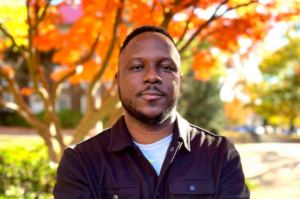
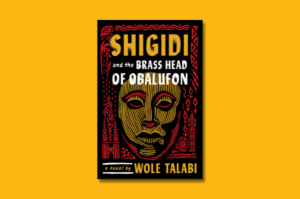
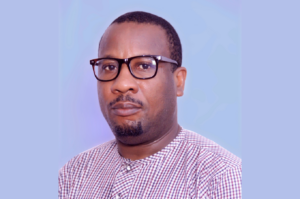

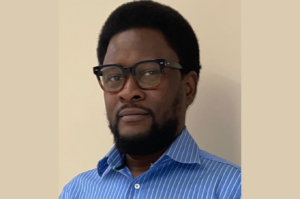
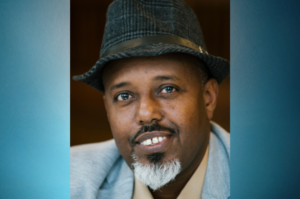

COMMENTS -
Reader Interactions